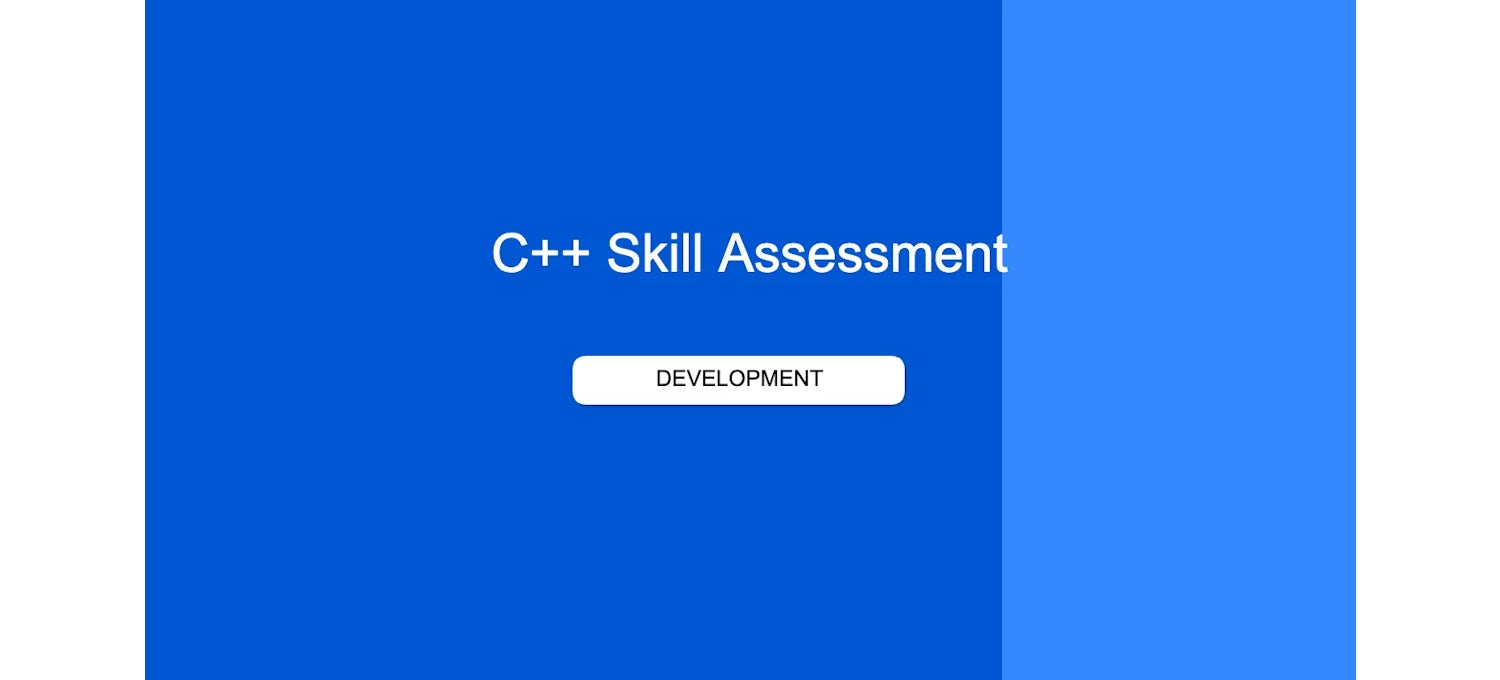C++ Programming Skill Assessment
Test your C++ skills with this quick assessment. Answer 10 multiple-choice questions to get your score, then check the Scoring Guide to find your level and recommended learning path.

C++ Programming Quiz
C++ programmers are in demand and have good career progression and high salaries. Answer the following skill-based C++ programming questions and click Submit to calculate your score. Use your score to find recommendations that align with your current skill level and explore career paths that interest you.
Test Structure
10 multiple-choice questions
Takes approximately 5-10 minutes
Immediate results with career recommendations
Custom learning paths based on results
1. What is the difference between new and malloc?
2. What will this code output?
int x = 5; int& y = x; y = 7; cout << x;
3. What is a virtual destructor used for?
4. Which smart pointer would you use for shared ownership?
5. What is the purpose of std::move?
6. What is RAII?
7. What is the difference between stack and heap allocation?
MyClass obj1; // Stack MyClass* obj2 = new MyClass(); // Heap
8. What is template metaprogramming?
9. What is the purpose of std::variant?
10. What is copy elision?
Scoring Guide & Course Recommendations
Your quiz score above aligns with a general proficiency level of beginner, intermediate, or advanced. Match your score to the ranges below and explore the recommended course.
0-30: Beginner Level
Skill Level: New to C++
Recommended Coursera Courses:
Coding for Everyone: C and C++ by UC Santa Cruz
Learn and debug C and C++
Understand algorithms and complex problem solving
Programming in C++ by Codio
Basic syntax
Control structures
Functions
C++ Basics: Selection and Iteration by Codio
Basic C++ syntax
Problem-solving skills
40-70: Intermediate Level
Skill Level: Familiar with basics, ready for advanced concepts
Recommended Coursera Courses:
Object-Oriented Data Structures in C++ by the University of Illinois
Object-oriented programming
Fundamental data structures
C++ Programing: Classes and Data by the University of London
C++ class construction
Data representation
80-100: Advanced Level
Skill Level: Experienced C++ developer
Recommended Coursera Courses:
C++ Programming for Unreal Game Development by the University of Colorado
Comprehensive C++ and Unreal Engine application
Game engine architecture
Object Oriented Programming by the University of London
Comprehensive C++ application development
Advanced programming techniques
Skills Covered by Level
As you progress in your career using C++, different levels have different skills, and here are some common ones.
Beginner Level
Basic syntax
Control structures
Functions
Basic OOP
Basic memory management
Error handling
Intermediate Level
Advanced OOP
STL containers
Templates
Smart pointers
Exception handling
Basic multithreading
Advanced Level
Template metaprogramming
Memory optimization
Concurrent programming
Design patterns
Performance optimization
Systems programming
Career Paths
C++ is a valuable addition to a developer's skill set. This versatile technology is commonly used in various careers within the software development and web development fields. Explore our Web Development Career: Decision Tree to understand better how your C++ programming skills can take your career in an exciting direction.
Beginner Level: Junior C++ Developer, Software Developer Trainee, QA Engineer
Intermediate Level: C++ Developer, Systems Developer, Game Developer
Advanced Level: Senior C++ Developer, Systems Architect, Game Engine Developer
Key Technologies to Learn
Some key technologies to focus on while pursuing your career in C++ programming are below:
Core C++
STL
Boost libraries
CMake/Make
Debugging tools (GDB, Visual Studio Debugger)
Version control (Git)
To learn more about C++ or to explore a career as a C++ developer, a great option is to earn a specialization on Coursera. Consider the Programming in C++: A Hands-on Introduction Specialization, designed for beginners. These programs cover C++ fundamentals and computer science concepts. Upon completing either program, you will gain a shareable Professional Certificate to include in your resume, CV, or LinkedIn profile.
Coursera
Writer
Coursera is the global online learning platform that offers anyone, anywhere access to online course...
This content has been made available for informational purposes only. Learners are advised to conduct additional research to ensure that courses and other credentials pursued meet their personal, professional, and financial goals.